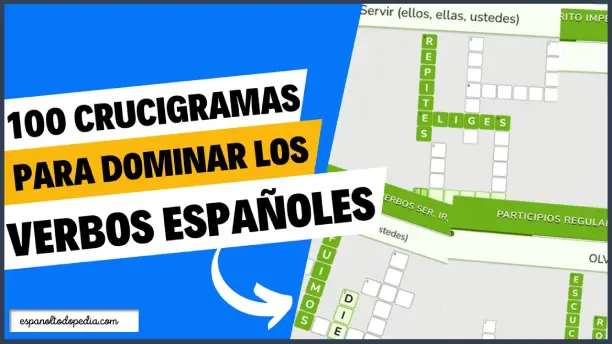¿Buscas una forma divertida y efectiva de practicar y aprender los verbos en español, tanto regulares como irregulares? En esta página encontrarás 100 crucigramas diseñados especialmente para estudiantes de español como lengua extranjera. Cada crucigrama te ayudará a, a ganar confianza al usar los verbos más comunes y esenciales del español, mientras refuerzas tu vocabulario y mejoras la gramática.
Empieza a mejorar tu español con nuestros crucigramas, descubre por qué por qué son tan útiles para aprender español y te damos algunos consejos para usar los crucigramas.
¡Estás preparado para aprender mientras te diviertes!
¡Bienvenido al desafío de los 100 crucigramas para aprender verbos en español!
Estos crucigramas están organizados para trabajar con los diferentes tiempos verbales, tanto en el modo indicativo e imperativo como en el subjuntivo, lo que te permitirá practicar la conjugación de los siguientes tiempos verbales:
- Presente de indicativo
- Pretérito indefinido
- Pretérito imperfecto
- Futuro simple
- Condicional simple
- Participio
- Gerundio
- Imperativo afirmativo
- Imperativo negativo
- Presente de subjuntivo
- Pretérito imperfecto de subjuntivo
Además, estos ejercicios no solo son entretenidos, sino también una herramienta educativa que puedes usar a tu propio ritmo y repetir cuantas veces quieras. También puedes imprimirlos y llevarlos a clase. Perfectos para principiantes, estudiantes intermedios y hasta profesores que buscan recursos para sus clases.
Por qué los crucigramas son útiles para aprender español
Aprender español es una aventura emocionante. Una forma divertida y efectiva de mejorar tu español es resolver crucigramas. Vamos a ver por qué los crucigramas son tan útiles para aprender idiomas:
Aprendes nuevo vocabulario
Los crucigramas te ayudan a conocer palabras nuevas. Al leer las pistas y buscar las respuestas, descubres vocabulario que quizás no conocías. Esto amplía tu vocabulario de forma entretenida.
Mejoras tu ortografía
Para que las palabras encajen en el crucigrama, debes escribirlas correctamente. Esto te obliga a prestar atención a la ortografía y te ayuda a recordar cómo se escriben las palabras en español.
Practicas la gramática
Los crucigramas incluyen diferentes tiempos verbales y estructuras gramaticales. Al resolverlos, practicas la conjugación de verbos y el uso correcto de artículos y preposiciones.
Desarrollas el pensamiento lógico
Resolver un crucigrama es como resolver un puzzle. Necesitas pensar de manera lógica y hacer conexiones entre las pistas y las palabras. Esto mejora tu capacidad para entender y usar el español.
Haces el aprendizaje más divertido
Aprender con crucigramas es más divertido que solo leer libros de texto. Te sientes motivado y disfrutas más del proceso de aprendizaje.
Consejos para usar crucigramas en tu aprendizaje del español
- Elige crucigramas para tu nivel: Busca crucigramas diseñados para estudiantes de español como tú.
- Ten un diccionario a mano: Si no sabes una palabra, puedes buscarla y aprender algo nuevo.
- Practica regularmente: Dedica un poco de tiempo cada día a resolver crucigramas.
Recuerda que los crucigramas son una herramienta excelente para aprender español. Te ayudan a aprender nuevas palabras, mejorar tu ortografía y practicar la gramática, todo mientras te diviertes. ¡Anímate a incluir crucigramas en tu rutina de estudio y descubre lo mucho que pueden ayudarte!
